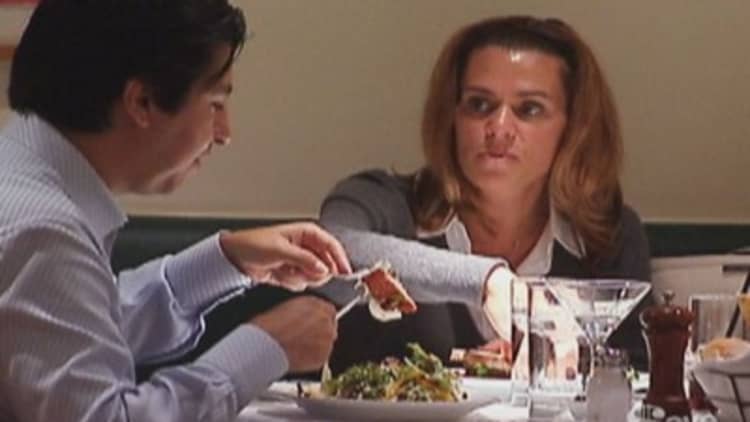Now that the Securities and Exchange Commission has proposed rules on crowdfunding, private companies looking for investors are one step closer to being able to pitch to the general public. The team behind Cardinal Spirits, a new craft distillery based in Bloomington, Ind., will raise a glass to that.
Its founders say Cardinal, poised to be just the fourth craft distillery in Indiana when it opens in 2014, also expects to be the first in the state—-and among the first nationwide—to use a variation on crowdfunding.
(Read more: CNBC explains crowdfunding)
In late August, the distillery closed on an $850,000 round of funding through Localstake, a new online marketplace that connects would-be investors with local private companies in search of cash. Now about a third of the company is in the hands of bar and restaurant owners, musicians and others who don't fit the typical investor mold.
"We have people from all different industries," said Adam Quirk, chief executive of Cardinal Spirits. "Our average investor is a small business owner in Indianapolis or Bloomington, … and there's a good amount of them that have not invested in private companies before."
It's crowdfunding, sort of.

Without SEC crowdfunding rules in place yet, private companies are barred from soliciting online for unaccredited investors—i.e., those who don't have either a net worth of more than $1 million (excluding the value of their homes) or an annual income of more than $200,000.
(Read more: SEC places restrictions on crowdfunding)
"This is still uncharted space," said Bernard Schroeder, director of programs at Lavin Entrepreneurship Center at San Diego State University.
Localstake founders worked around that by registering as a broker dealer with the Financial Industry Regulatory Authority and the Securities Investor Protection Corp., said Kevin Hitchen, a Localstake co-founder and its director of marketplace development. Hitchen, who is also a chartered financial analyst, said that route lets Localstake offer the investment to people who don't meet accredited investor qualifications.
The longer the SEC delays in implementing rules, the more companies are likely to look at the broker-dealer route and other workarounds, Schroeder said. "Everyone starts to look at what can we do?" he said. "It's pressure against the dam."
But the projects are still a far-cry from those attracting consumers to projects and causes on sites such as Kickstarter and Indiegogo, where $5 gets you a thank-you note and $100, perks like an autographed hardcover book or a smart power strip. "Anybody that's investing $50, $100, is more likely to be excited about the project" than seeking a serious investment, said Schroeder. "It's microbets."
(Read more: 7 crazy crowdfunding projects that succeeded)
In comparison, Localstake allows companies seeking investors to set minimums as low as $1,000; Cardinal Spirits asked for at least $2,500. Bigger risks, with the potential for bigger returns. Localstake set a target return of roughly 25 to 35 percent for equity stakes.
"Most of the nonaccredited investors are not a 26-year-old who just graduated from law school," Hitchen said. According to Localstake figures, its investors—54 percent of whom are unaccredited—earn an average $150,000 per year and have a net worth of at least $500,000.
There's also a bit more paperwork than a typical crowdfunded project. "We do put self-imposed limits on people, on how much they can invest," Hitchen said. Would-be investors must divulge details of their finances and net worth, and sign forms acknowledging the risks on private business investing.
One of the first-timers, Debby Herbenick, a sex researcher at Indiana University, invested enough to own a little less than 1 percent of the distillery. "The bar is set pretty low for what's a good enough return these days," she said. "I'm always looking for ways to diversify my investments."
The local angle added appeal. "It seems like a business we want to have in our town," Herbenick said. And from an investment perspective, she liked the opportunity to meet key players and watch the business grow firsthand.
Cardinal expects to release its first products next spring—a vodka ($25) for the local market and the first of several styles of gin ($30) to be sold nationally. Quirk said liquors made from local herbs and produce will follow, along with a series of young and increasingly mature whiskeys. Taking advantage of an Indiana law in effect since July, the distillery will sell bottles directly to consumers online, and through its "Birdhouse" tasting room and restaurant.
"We're trying to see what holes are in the market," Quirk said. "You can't just bank on a local market."
To that end, he sees the crowdfund contributors as an investment of more than capital. "Having some investors who are already bought into our company is great when we launch," he said. "They're our national brand ambassadors."
—By CNBC's Kelli B. Grant. Follow her on Twitter @kelligrant.


